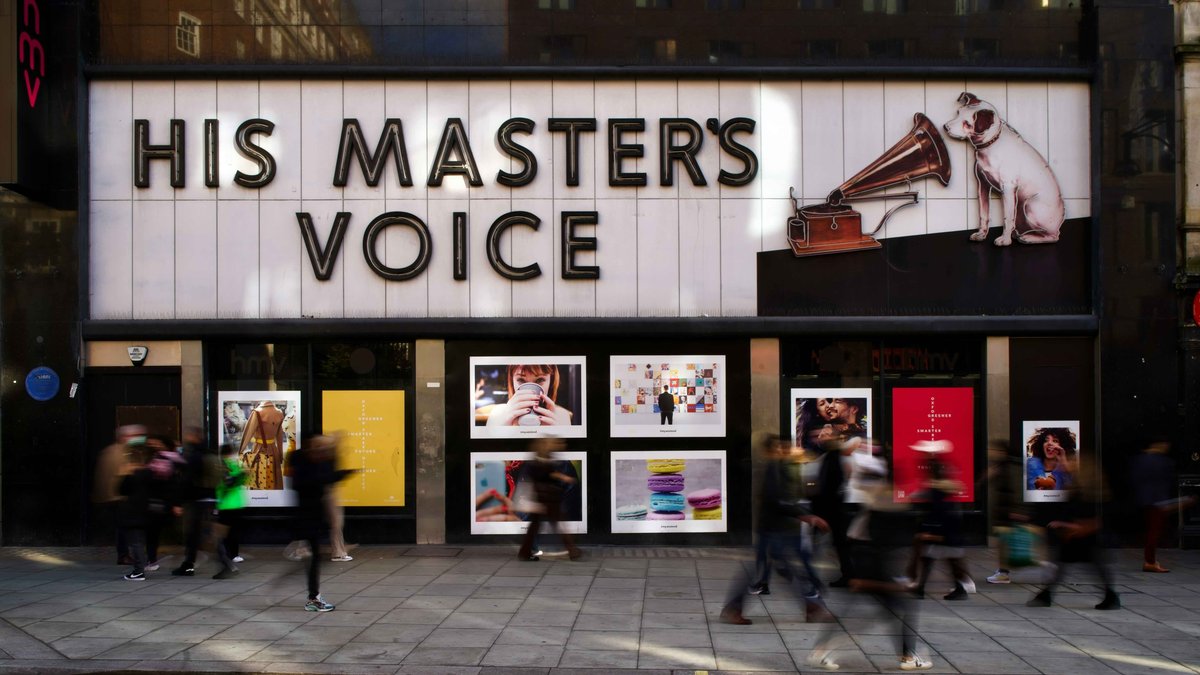Few names in British retail stir as much nostalgia as HMV, the pink-neon chain that once defined how the UK consumed music and film. At its peak in the mid-2000s, HMV was worth over £1.2 billion, operated hundreds of stores worldwide, and stood as a cultural anchor on nearly every high street. By 2019, the storied brand changed hands for less than £1 million. The rise and collapse of HMV is not just a cautionary tale about one retailer, but about how entire industries can be blindsided by digital disruption.
A High-Street Giant
Founded in 1921, HMV (His Master’s Voice) built its reputation as the go-to destination for music lovers. The 1990s and early 2000s were its golden years: blockbuster album launches, midnight queues for Harry Potter DVDs, and the sheer excitement of browsing aisles filled with CDs, vinyl, and VHS tapes.
In 1998, HMV Group floated on the London Stock Exchange at a valuation near £1 billion. Less than a decade later, the company’s worth peaked above £1.2 billion, buoyed by DVD sales, chart CDs, and gaming titles.
The Digital Tsunami
Then came the crash. The rapid rise of iTunes, Amazon, Spotify, and Netflix reshaped how consumers accessed entertainment. Instead of purchasing physical discs, people streamed or downloaded with ease—and often at lower cost.
HMV was slow to react. While supermarkets undercut CD and DVD prices, online competitors offered convenience and selection that HMV could not match. The chain’s attempts to diversify—selling tech products, headphones, and even live event tickets—proved too little, too late.
The First Collapse
By 2013, HMV was drowning in debt and collapsing sales. Administrators were called in, and the once-mighty company faced liquidation. Enter Hilco Capital, a restructuring specialist that acquired the business for around £50 million, salvaging about 140 stores and thousands of jobs.
For a time, Hilco’s intervention worked. HMV slimmed down, renegotiated leases, and even returned to profitability. Vinyl sales offered a glimmer of revival. But the underlying tide of digital disruption never reversed.
The Second Administration
In December 2018, HMV went under once again. Streaming had grown into the dominant way people consumed music and film. Physical sales, while niche and growing in vinyl, could no longer sustain a large retail footprint.
The following year, Canadian chain Sunrise Records swooped in, paying just £883,000 for HMV’s brand and assets. It was a symbolic figure that underlined how far the giant had fallen—from billion-pound behemoth to a bargain-basement buy.
Lessons from HMV’s Fall
HMV’s story is not simply about management missteps or bad timing. It is about the structural destruction of entire business models when technology reshapes consumer habits. Even deep brand loyalty and heritage cannot defend against fundamental shifts in how people consume media.
The fall of HMV shows that:
- Disruption is unforgiving: Digital alternatives can erode a century-old business in a matter of years.
- Adaptation must be proactive: Waiting to react almost always comes too late.
- Heritage has value—but not immunity: A beloved brand may survive, but often in diminished form.
The Brand That Refuses to Die
Today, under Sunrise Records, HMV still exists on UK high streets, albeit in a leaner and more niche form. Its flagship store has reopened on London’s Oxford Street, and vinyl’s resurgence has given the chain a small but vibrant lifeline.
Yet the tough reality remains: HMV will never again be the titan it once was. Its decline is a reminder that even the most iconic retailers are only as strong as their ability to adapt to the next wave of consumer change.
